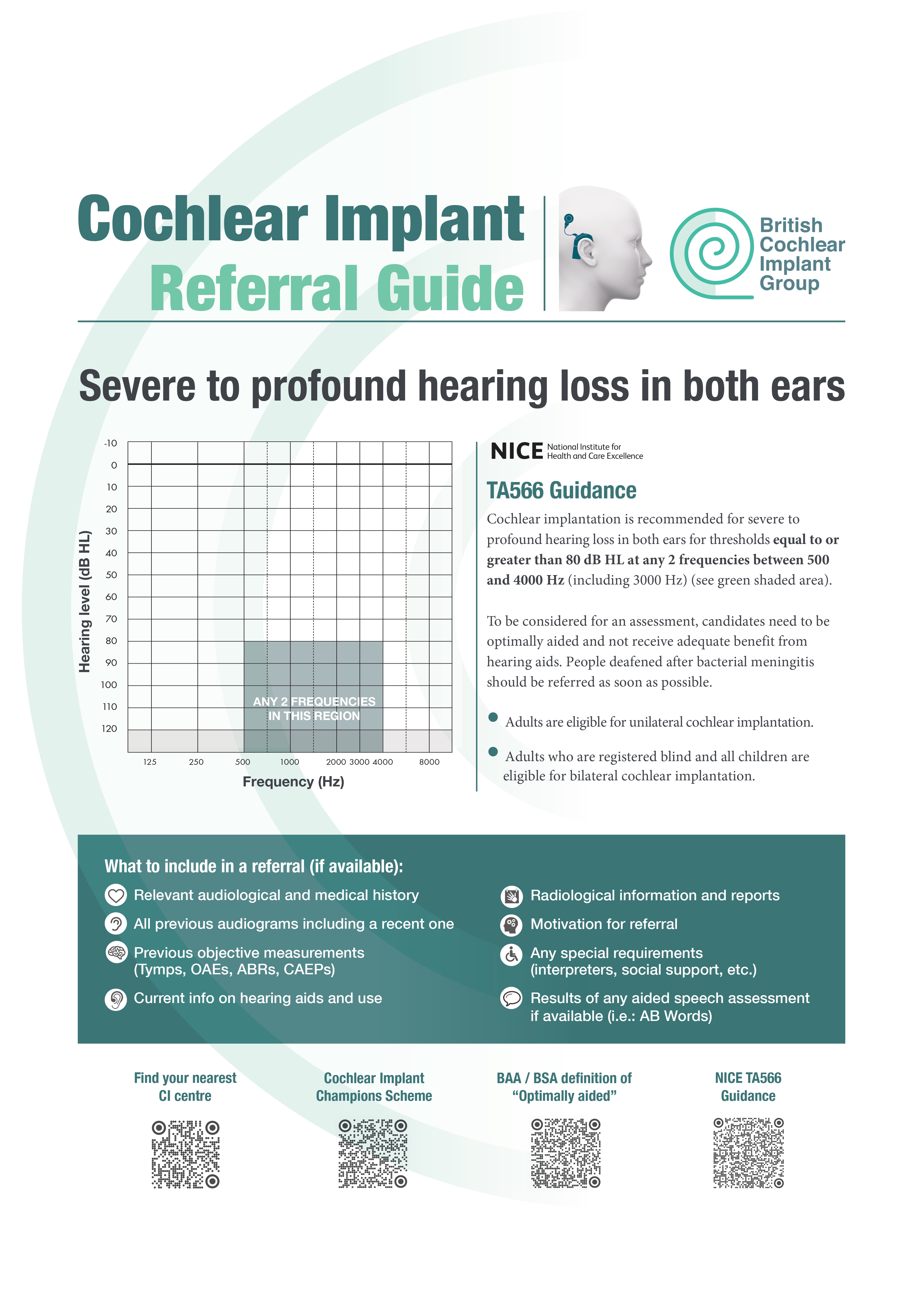Professionals
BCIG Poster - referral guidelines
Would you like to encourage more local audiology services to refer patients for cochlear implant assessment? BCIG have produced a poster for audiology test rooms. We suggest that this is placed above the audiometer, in the hope that it will alert the audiologist (during testing) if a referral for CI assessment is indicated.

Please click here to download a poster for your department.
Auditbase: BCIG Referral Report
The BCIG has a Crystal report that was developed after excellent collaboration between Auditdata, a number of pilot Audiology departments (Manchester Royal Infirmary, Middlesbrough, Southend, North Devon District Hospital and St George’s hospital) and Cochlear. Given the importance of this project we are pleased to announce that it is now supported by all four cochlear implant manufacturers (Advanced Bionics, Cochlear, MED-EL and Oticon Medical).
The BCIG CI Referral Report allows Audiology departments to identify and analyse patients who fall within CI audiometric candidacy guidelines in a time-efficient way. Audiologists can monitor what happens to the referral status of their patients over time and identify initiatives to help improve their referral practice. The BCIG can help you find one-to-one support in using the report, analysing the results, and setting action plans. We suggest running the report every 3 months.
Please contact us info@bcig.org.uk to receive the report; there is more information in the BCIG CI Referral Report user guide.
However if you have Auditbase 6.4 and beyond, you may not need the CI Referral Report. You can go to Onward referrals and reporting and SWITCH ON the rule based on audiogram for CI referral (it is off by default).
That will then put a black box round all future potential referrals when the audio is saved.
However within there you can also search by hearing loss and date range to catch up ….
More information on the Champions Scheme can be found here.
If you use Practice Navigator, please see ‘Step 2: Finding the patients’ on BAA website, and for a copy of the report please email: admin@baaudiology.org
How and when to refer for a cochlear implant
See the latest guidance by NICE (update in March 2019) on cochlear implants for children and adults with severe to profound deafness here.
Cochlear implant referrals are accepted from Audiologists (NHS and private), ENT specialists, General Practitioners, and other specialties. Please contact your local cochlear implant centre for specific referral guidelines.
All cochlear implant centres in the UK abide by the NICE TA566 guidance and will consider a referral if the criteria below is met:
“Severe to profound deafness is defined as hearing only sounds that are louder than 80 dB HL (pure-tone audiometric threshold equal to or greater than 80 dB HL) at 2 or more frequencies (500 Hz, 1,000 Hz, 2,000 Hz, 3,000 Hz and 4,000 Hz) bilaterally without acoustic hearing aids”
For borderline cases, please contact your local cochlear implant centre centre for advice.
Deafness and hearing loss Toolkit
Deafness and hearing loss Toolkit
Learning
For your continuing education, please find some links to resources that the cochlear implant manufacturers provide. BCIG does not endorse content provided by manufacturers
Advanced Bionics:
Event calendar
Cochlear:
GoToStage CI Education
Cochlear Science and Research Seminars (CSRS)
Cochlear Peer Network for referring professionals
MED-EL:
MED-EL Academy
Podcasts
Oticon Medical:
Oticon Medical Webinars
Other:
CI Futures Forum Webinar Series
Yellow card
Reporting a problem with a medical device to the MHRA
We strongly encourage reporting of any adverse incidents involving devices to the Medicines and Healthcare products Regulatory Agency (MHRA) via Yellow Card. This includes adverse incidents with cochlear implants following an MRI scan. Yellow Card reports help to detect any adverse trends.
Please find more information here.